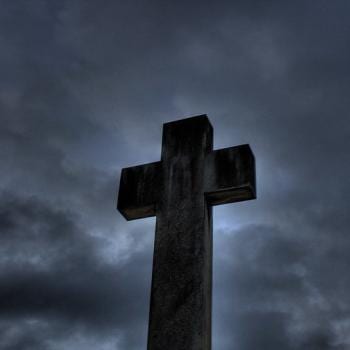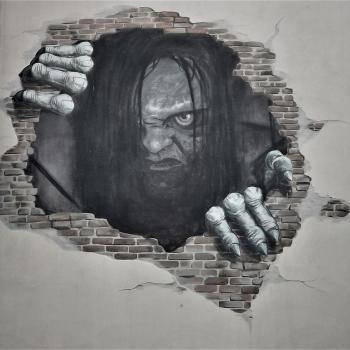Calvary is the fulcrum of history.
Everything changed on that hill called Golgotha 2,000 years ago. Three days later, when the stone rolled away, God put His final redemptive imprimatur on the story of our salvation.
Before that Day in the garden outside the empty tomb, when He looked at the woman and said, Mary!, Solomon’s ancient wail of “Vanity, vanity; all is vanity,” was the summation of the reality of human existence.
But Calvary and what He did there, the garden and Who the woman met there, changed all that forever.
Do not eat of the fruit of the tree of knowledge, for you will surely die, God told them.
“You will not die,” Satan countered, in one of the deceptive lies disguised in a seeming truth that he uses so often against us.
They ate.
And they did not die.
Then.
But death was born into the world with that first bite of disobedience. The scales fell from their eyes and they knew. They fouled their primal innocence with willfulness, and they knew shame; first the shame of their nakedness, and then the shame of their fallenness.
Their first action was to hide from God because, as they told Him, “We were ashamed because we were naked.”
God’s answer illuminates their changed condition, Who told you that you were naked?
Their second action was to blame one another.
Primal innocence was gone in a single bite of the apple of disobedience, replaced by primal love of self.
Humankind denied this loss throughout its history, denies it even to this day. Self-will battles with God’s will in each of us every moment of our lives. And yet, there is in each of us, encoded in our souls, a haunting memory of who we really are, and an inchoate longing that will not be silenced for what we have lost.
“Our hearts are made for thee,” St Augustine said. And so they are.
God-longing is a part of the human condition, as is a hunger for transcendence and lost innocence. Separated as we are, this longing festers into resentment and denial, while the hunger congeals on our souls as hubris and self-worship.
The curse of lost innocence drives us to rageful disobedience. It ensnares us in our own desires and, if we let it, murders us with the excesses those desires breed in our lives.
Throughout human history this pull of longing for God and lost innocence has played against the push of the hubris of our self-aggrandizements and twisted desires. The tension it creates drives us into a universal acceptance of insanity. We kill one another and we kill ourselves in as many ways as the human story can devise. Our blood-soaked history of suffering and misery has one message: We cannot save ourselves.
The God-hunger encoded in us and the God-image inside of us, drive us to seek propitiation. From moloch to corporatism, we feed our lives and the lives of our children into the empty maw of false gods of our devising. We seek our lost transcendence in debauchery and achievement; in doing good and doing bad; in war making and peace making; in causes and rights and laws.
We try to achieve a lost immortality by looking as Ted Bundy did, into the eyes of those we kill and persuading ourselves that in that moment when the light of life fades we are like gods. We attempt to overcome our finite hopelessness by doing good works, and advancing humankind through the achievements of our efforts and our minds.
But in the end, we are but dust. Vanity, vanity, all is vanity.
God does not force us. He doesn’t reach down and re-invent us back to our lost innocence.
That is not cruelty as some claim. It is love and longing. Love, to be love, must be freely given. Our love for Him must be ours to give or withhold, or it is not love at all.
So God led us gently over long years and slow changes to the moment when He stepped into our history as one of us in order to offer us a Way. Jesus had to die because by dying He became the ultimate sacrificial lamb, the complete propitiation for our sins. He made it right by offering Himself in lieu of us on the altar of life and death.
He was our Passover lamb and Calvary was the ultimate and final Lord’s Passover.
If that is true, then what is the meaning and the necessity of the Resurrection? Wasn’t dying on the cross enough to redeem us?
The answers people give are all true. The Resurrection demonstrates that Jesus is God. The Resurrection is a sign of the resurrection that awaits all of us who accept Him and go through the open doorway of redemption that He represents. He is the Way in a literal and absolute manner. We enter into the Kingdom through Him.
But I think there is another ultimate meaning to the Resurrection. Calvary wasn’t the only way that God could have restored us to Himself. It was the only way He could do it and leave us free.
The Resurrection was the great undoing of that curse we cursed ourselves with in the garden. If you eat of the tree of knowledge, you will surely die.
You will not die, Satan told us, and left out the word “today.”
We believed the lie, and the curse of death, real death that is separation from the Light, entered humanity.
The Resurrection broke that curse. God Himself entered into death, took on the curse, and experienced its depths. My God, my God, why have you forsaken me, Jesus cried from the cross as He experienced the cold annihilation of The Alone in its absolute form.
I’ve have written about The Alone that we inflict on one another with our cruelties. But that Alone, which is a foretaste of the pit of hell, is nothing but a foretaste. The real hell, the true Alone, is complete separation from God.
We experience shades of this hell in the bitter blackness of our sinfulness. I have lived a bit of it, both in things I’ve done and things that have been done to me. The pleasure people take in hurting other people is a dark thing that swallows their own humanity.
We can cast other people into The Alone with our rapes, tortures, murders, greed, gossip and pretentious claims to superiority. Every time we do this to another person, we experience a bit of the cold blackness that such actions come from.
The curse of the fall is our daily experience, and that curse is death. The Resurrection broke that curse. God entered into our cursedness and experienced its shattering consequences. He, Who knew no sin, became sin for our sakes.
Then, on the third day, He shattered the curse like a glass by breaking death itself. He cast off death and arose from the grave.
This was different in every way from miracles such as raising Lazarus or the little girl or the young man who was being carried to his burial place. The difference is that He didn’t stand outside death and undo it for a time, He entered into death and dissolved it for all time.
Physical death is a huge thing to us. But to God it appears to be almost trivial. Jesus raised people from the dead as easily as taking a drink of water. Little girl arise, He said. He took pity on a mother’s grief at her son’s funeral procession and raised the young man with a word. Lazarus, come forth He commanded and Lazarus walked out of his tomb.
Physical death isn’t the great divide that it is to us to One who sees both sides of the experience, to the One Who created life in the first place.
The Resurrection isn’t another casual raising of someone from the dead so that they will die again in a few years. The Resurrection is an everlasting casting off of ultimate death altogether.
Eat, and you will surely die.
You will not die … today.
I am the Way … all who believe in Me will never die.
The Resurrection is the end of death. It is the Way out of getting what we deserve.
And it leaves us free. We can accept Him and love Him … or not.
Love is not love unless it is freely given.












